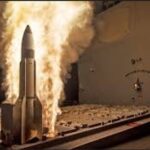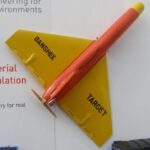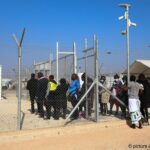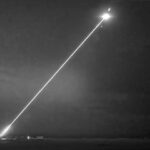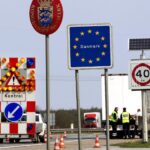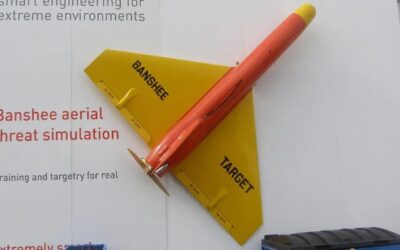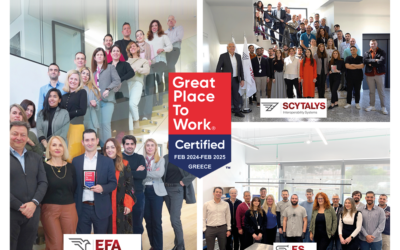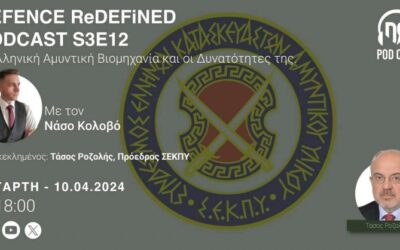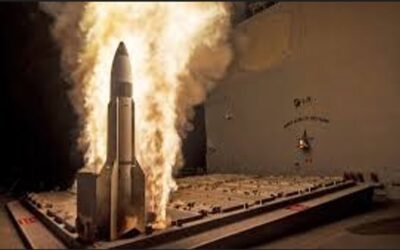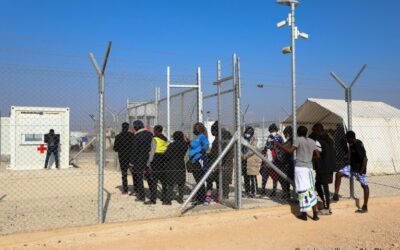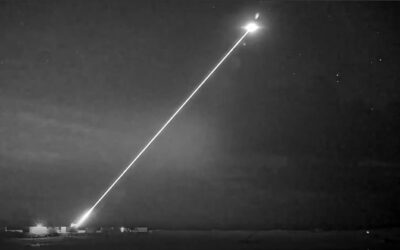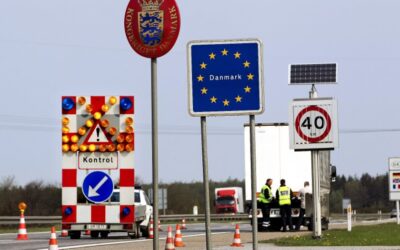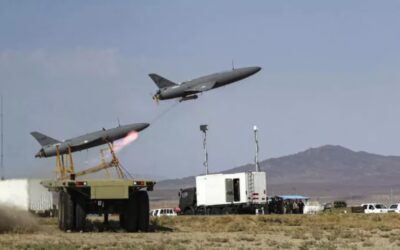Yesterday Sunday, intense confusion was caused on a beach in Heraklion, Crete, when an aerial target used in shooting ranges to test…
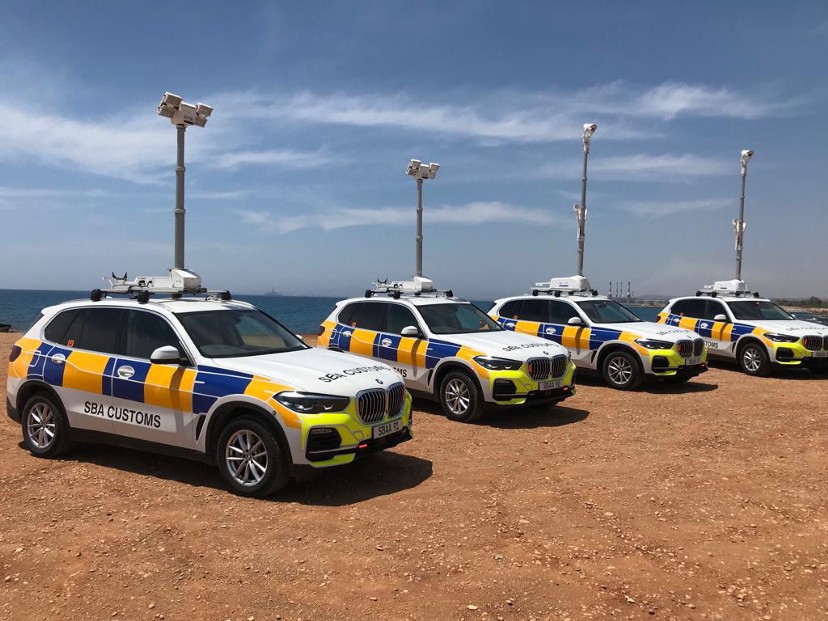
*Lambros G. Kaoullas (PhD)
DEFENCE ReDEFiNED, as part of its activities for extensive information on Defence, Security and International Relations, conducted via its special associate, Lambros Kaoullas (PhD), an in-depth interview with Mark Hartley, Officer-in-Command of the Eastern Sovereign Base Area (SBA) in Cyprus.
Mr. Hartley is responsible for the two official Crossing Points in Pergamos and Strovilia in the area of Agios Nikolaos and via the interview, he presented to us, among other things, the modern equipment for surveillance available to the SBA Customs & Immigration (C&I) as well as exclusive information concerning its activities.
Our first part of the interview can be found here, while below is the second and final part.
LK: According to open sources, the arrivals through the British Bases in the Famagusta area, registered by the local Aliens & Immigration Unit of the Cyprus Police, up until mid-February 2022 were the following: 2020: 17, 2021: 47, 2022 (1/1 – 17/2): 41. So there has been an escalation in numbers. What is the situation here?
MH: “We cooperate with the Aliens & Immigration Unit of the Cyprus Police in Paralimni. So we cooperate with them very closely, we hold a really good relationship with their divisional commanders, we have the Larnaca Division as well, so there’s obviously some Larnaca numbers to overlay on top of that as well for some of the other interceptions that we make.”
LK: Do you ever patrol or make yourself present beyond the boundaries of the British Bases?
“We have a number of liveried vehicles with our insignia. There are a number of meetings that we attend in the RoC and those vehicles will transport our personnel. When requested by the Republic to provide any technical assistance we would willingly provide that noting, obviously, that there are jurisdiction issues but, for example, if we are transporting somebody, a removal for example, we are removing somebody from the island of Cyprus, that may be done by air, out of Larnaca, when we transport that person through the RoC we would have the RoC there because they would need to invoke their powers and jurisdictions should they need to.”
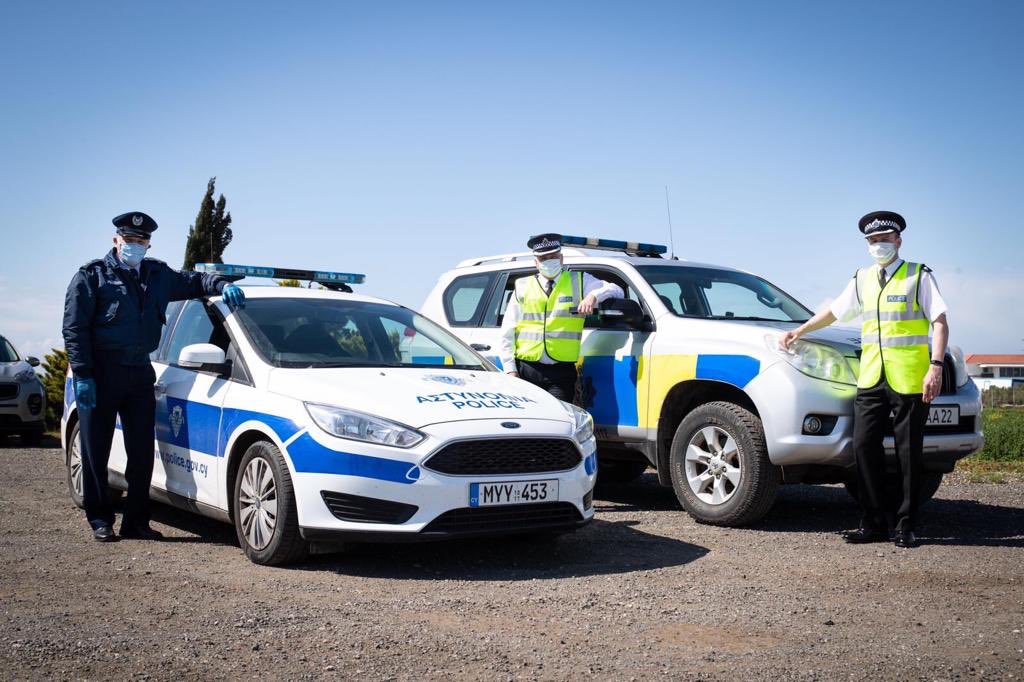
Cooperation with Cyprus Police ©BF Cyprus
LK: The political geography of the immediate area is quite unique. It consists of a “triple point of contact” between the British Bases, the UN-controlled Buffer Zone and the RoC, and it’s “quadruple point” if we include the Turkish-occupied area. Do you have any cooperation with UNFICYP in general and UNPOL in particular?
MH: “Again, we hold a mirrored relationship with the UN, as we do with all the other agencies on the island of Cyprus. And again, you know, the UN are there to police the buffer zone and we don’t want there to be a weakness in our collective response. If we are looking to intercept somebody we don’t want them to be able to use the buffer zone as an escape route, for example.”
LK: Let’s take for example the village of Pyla. For someone who’s not familiar with the geographical and political bits and pieces, they might not be aware when they enter RoC areas, or BB areas or UN-policed areas.
MH: “And that’s one of the kind of definitions within the Treaty, there is not to be no hard border between the SBAs and the RoC. So you are right, we can transit through those areas as anybody can with the freedom on the island. What we have in the Strovilia area, we almost have a triangle where we have the north of Cyprus boundary, we have a boundary with the UN, and beyond that to the right, we also have a boundary with the RoC.
What we do is we forge and maintain relationships and specifically on the question you’ve asked, yes, we have that relationship with the UN Police and collectively work with them. We’ve a number of examples where we’ve intercepted smugglers who’ve looked to use Buffer Zone as an escape route where our jurisdiction obviously ends, but through direct communication and contact with the UNPOL we were able to bring them into the areas that were required and work together to intercept the smugglers.”
Also read: United Nations | Incident with Turkish soldiers in buffer zone
LK: It must take excellent interpersonal skills to overcome the political overlay!
MH: “That’s one of the key things to touch on. We have a number of UK officers throughout the administration and British Forces Cyprus. But the key to this is our locally employed staff. We in Customs have luckily employed staff from all communities within the island of Cyprus and they’re the key to holding those relationships, holding this sort of cooperate history. And where we have movement of UK officers throughout. So, what is the stability and the constant is the locally employed officers. And they hold those relationships. A number of them are family friends, some of them are even related family, so we have that really “the island of Cyprus, one big small village”, as it has been described to me! And that what makes it work so well is the fact that those relationships have been there pre-colonial times, obviously, with the Cypriot community and then are the things that happened on the island and the UN brought on to the island and we’ve now got agencies in the north working.
What we were able to do is keep those relationships, work with them. And that’s what gives us great success. We’ve touched on the kind of mass migration that the RoC is seeing. But I think it’s got to be identified that we are all working extremely hard, no more so than the RoC. And if we were not pushing forward the efforts and endeavours that we are doing, that number would have only been significantly higher.”
LK: Besides immigration, as Customs, what other issues regarding smuggling do you deal with? For many years there have been reports of cigarette smuggling, firecrackers and recently there was a fuel smuggling operation in Pergamos. What types of smuggling do you deal with here?
MH: “Where there’s tax applicable there will always be somebody trying to evade that duty and make money for themselves. So smuggling of alcohol, cigarettes, tobacco throughout the world happens because obviously due there’s a levy on those. Now, uniquely what we see on the island of Cyprus, fuel for example, and we said, spirits, depending on what side of the Green Line is the cheapest you likely to see the movement of those goods.”
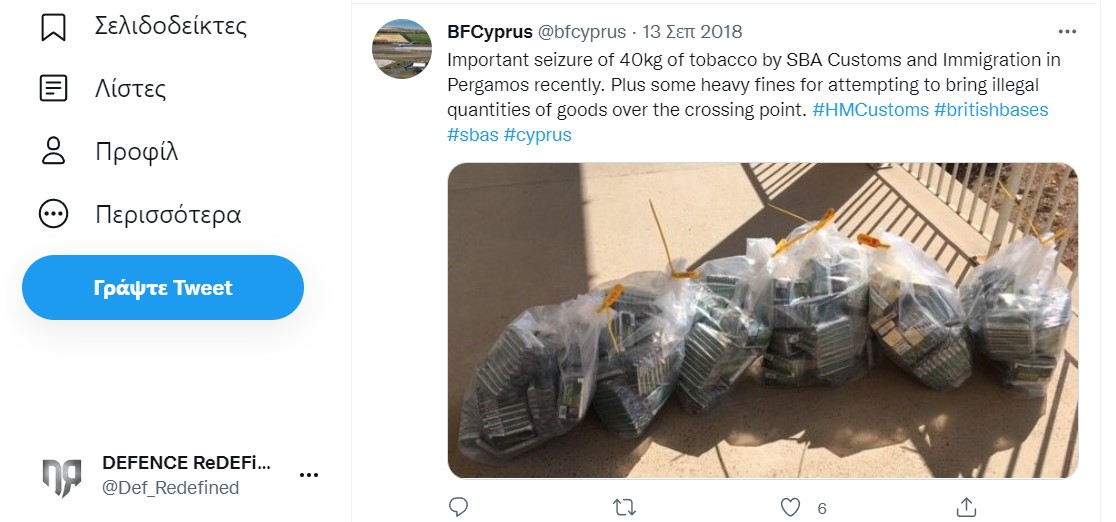
LK: So you see smuggling from the RoC to the occupied areas?
MH: “Yes. Chicken, is one at the moment, ‘kotopoulo!’ So, you will see that chicken is cheaper in the RoC so the movement of chicken, and historically there has been halloumi as well, has been smuggled to the north. Now, we are going back, and it’s anecdotally from what my officers have told me who’ve been here since, some of them first enlisted in 1974, they’ve seen when fuel was cheaper in the south, they’ve seen that smuggling of fuel to the north. We enforce inbound and outbound legislation. So, obviously we are there to protect the Green Line, which is EU regulations and that’s in goods crossing both ways so we have to be relevant with that.”
LK: So that applies to checkpoints like the one here in Pergamos which touches directly onto the occupied area? EU Green Line regulations have to be applied here as well?
MH: “Yes, that’s correct. The Green Line regulation stipulates within the SBA Crossing Points, and quite uniquely within that regulation, there are more protocols on the SBAs within that regulation than there are in the wider RoC Crossing Points. So for an example, third country nationals cannot cross the Crossing Points of the SBAs and that’s an agreement with the EU, that was something that was readdressed in the Withdrawal Agreement and that obviously provides Cyprus, the RoC, to do the checks on third-country nationals coming onto the island for example, in those areas. But yes, the different types of smuggling with the weakened Turkish lira and the lower fuel prices in the north late last year, earlier this year we identified a significant amount of fuel that was attempting to cross.”
LK: With the rates of inflation rising in the last months, have you witnessed more Greek Cypriots crossing to the occupied areas who normally would not but are in a more difficult economic position?
MH: “Certainly. The covid restrictions obviously now ceased at the Crossing Points, that’s seen an influx and that has allowed a lot more communities within the RoC to access to the north for cheaper produce, cheaper fuel. Now, there is a recent increase in taxation on alcohol and fuel in the north. But that is still cheaper than in the Republic. So we do see movement and busier crossing points for people taking advantage of that.
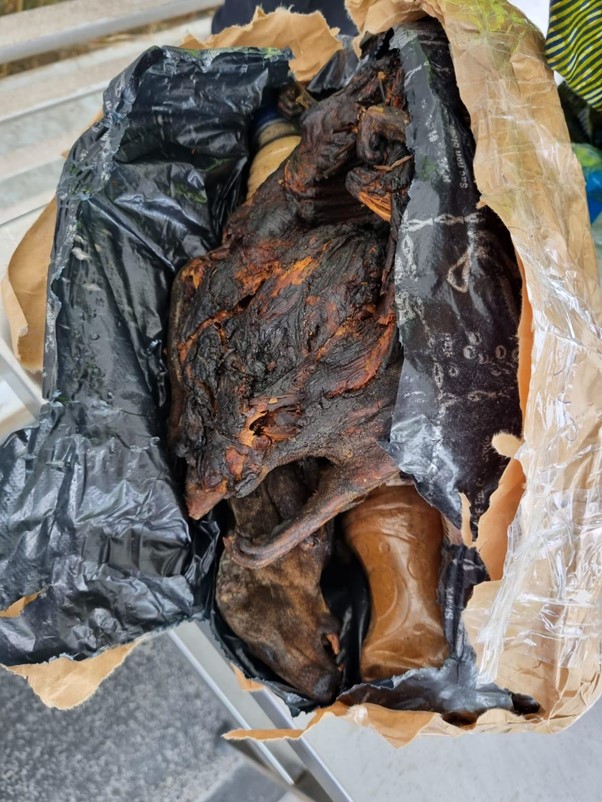
West African Bush Rat ©BF Cyprus
We come across some of the more peculiar seizures! We have West African bush rat. So it’s a West African rat that’s smoked dried and that kind of links to that population and it’s edible. Offensive weapons, we’ll see knuckle-dusters, extendable batons, sticks, all those types of items that are prohibited and restricted. We see the traditional snails…”
Also read: Police and SBA operations continued to control transportation
LK: They are peculiar to others, not to us! Great source of Omega 3, by the way!
MH: “I have tried them! In a restaurant! Again, what we look for is products of endangered species. We do make detections of smuggling of black caps, the birds (ambelopoulia), the seasonal movement of that. We do detect quantities of drugs.”
LK: All types of drugs?
MH: “Throughout history, yes of course, I’d say in general, it is in limited numbers and predominantly is more user quantities than commercial quantities but we have worked closely with agencies on the island of Cyprus to intercept commercial quantities of cannabis that are moving north, from south to the north. And I think, just to add one other thing that we’ve been intercepting now, sorry we are drifting back into the migration piece, we are actually seeing now registered asylum claimants and registered refugees who are attempting to leave the island of Cyprus by transiting through the SBAs to illegally exit through the wider boundary back into the north of Cyprus to claim upon detection by the north of Cyprus that they’ve just illegally entered in an expectation that the north of Cyprus to remove them back to Turkey…”
LK: So they can continue into Europe?
MH: “No. These are displaced Syrians who carried out the journey north to south, registered in the RoC and then they are attempting to get back, whether that may be for other economic reasons, maybe to go back and see family, to try and attempt to get back to the initial areas of Turkey and Syria that they came from.”
LK: It might be related to the recent announcement by the Turkish government of relocating some Syrians back to Syria?
MH: “Quite possibly. And some of these are just illegitimate use of the asylum system. You know, what we do see, and we see this throughout Europe, is that an individual will attempt to claim asylum in several different countries to use that as an economic way of receiving benefits under different identities.”
LK: And perhaps hide between different identities for other operations?
MH: “Exactly. And so we work very closely, again, with all the agencies.”
LK: Many who enter the RoC from other areas and claim asylum carry no identification documents. Do you have that here? And if yes, how can you cross-check who these people really are?
MH: “It is very difficult and your are right, the majority of times somebody who arrives will not have an identity document and one of the reasons is if we or the RoC or whatever they do in the north, refuse somebody as not being a genuine migrant or their claim doesn’t meet the threshold, obviously we look to remove those people back to were they came from or back to their country of origin.
Now, the easiest way to do that is with a document. Now, we recently removed an Algerian national back to Algeria, he was intercepted with an Algerian document but he also had counterfeit Dutch documents. He believed it would give him access to Europe. However, his true nationality was Algerian, we intercepted his document as well, so we were able to remove him back on that document. Now there are agreements that exist within the Chicago Convention, agreements exist between countries to remove their nationals back. But obviously it’s a lengthy process and it takes a lot of time and I believe that is the process that currently is restricting the RoC that 60,000 applicants, around 13,000 not meeting the criteria, but they’ve removed maybe 1,500 roughly, and the difficulty is documenting them.
Now, there are European agencies such as Frontex that are able to come in and assist with that, they can liaise between those other countries to get them documented to find out who they are. Now sometimes you are down to biometrics and whether those people are being intercepted within Europe and their biometrics taken and are therefore registered on the Eurodac system, the databases within Europe. But you are right, that is the difficulty, the identity of that person. It’s interesting, but that is the work that we do. We are obviously an intelligence and task force team.
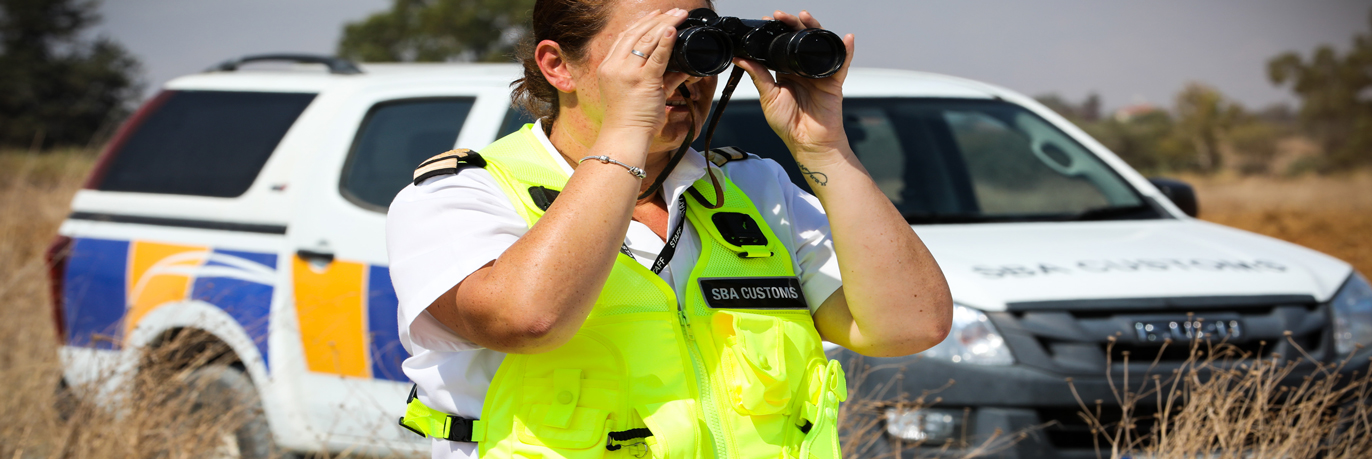
SBA Customs & Immigration Officer ©BF Cyprus
Customs & Immigration, slightly different to how the RoC work but inline with how the UK Border Force work. Our officers are dual trained. And that works well at the Crossing Points as you can probably see here, when a vehicle arrives an officer intercepts that vehicle and we’ll do a number of initial questions. Now, what that officer can do is cover off the immigration and customs questioning at the same time, if for example we searching the boot of the vehicle or a large area within a lorry, that officer is looking for people who may be hiding within there, but we are also looking for smuggled goods that may be in there. So we are able to do that dual role.”
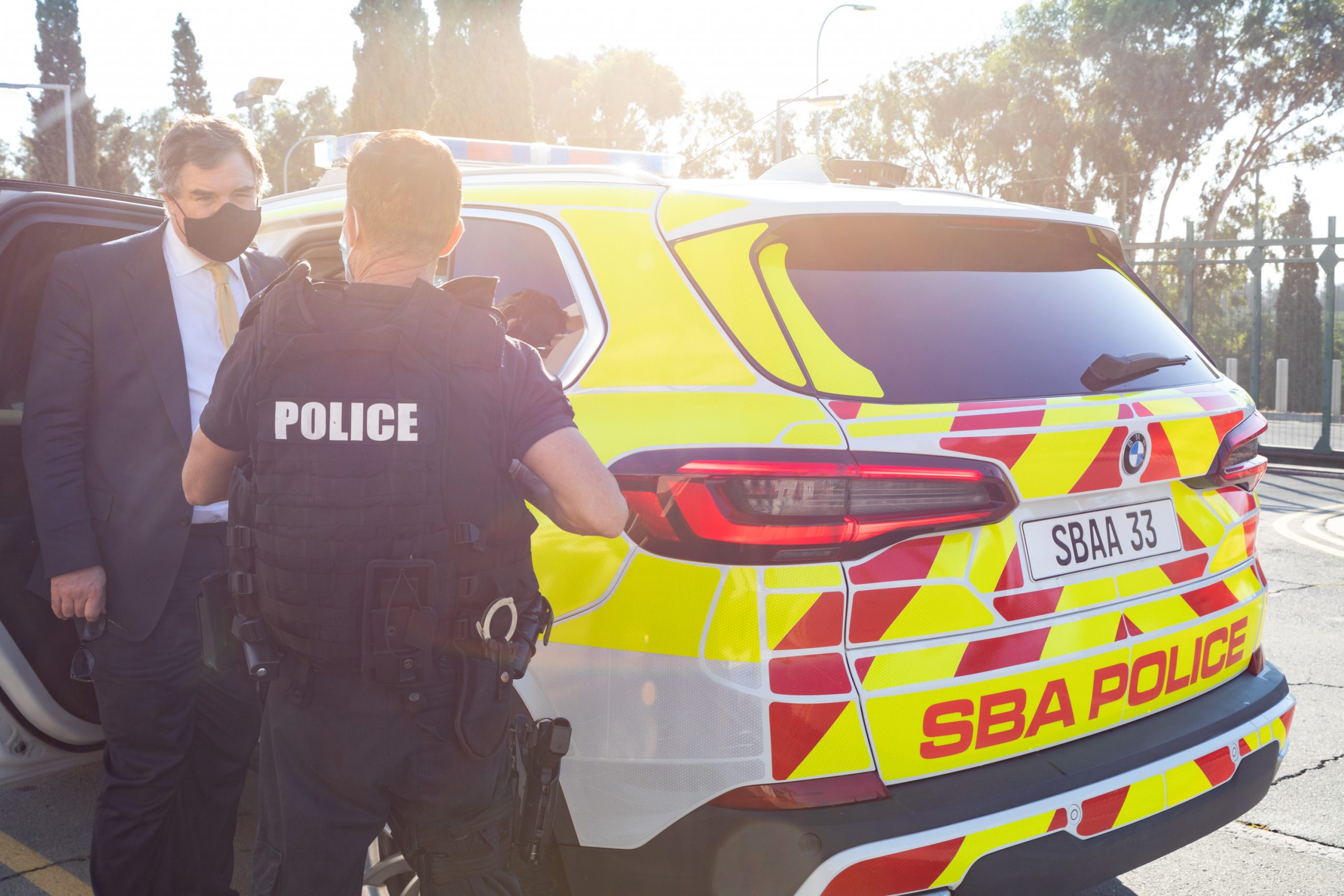
SBA Police BMW X5 ©BF Cyprus
Also read: SBA | Receipt of 6 armored BMWs for policing needs – VIDEO & Photos
LK: Is Customs & Immigration a unit part of the Border Force or the military?
MH: “C&I is an Administration Department. So SBAs are administered by an Administration. So the Administration is the Civil Component to the British footprint, I would say, on the island of Cyprus. So within the Administration, we have the SBA Police Force, we have the SBA C&I, Environmental Department, Area Officers, it’s the civilian arm basically. So you have the military on one side and the civilian on the other, and C&I is on the civilian.
I am a UK Border Force officer, an OIC (Officer-in-Charge), I am a Senior Officer in the UK Border Force. Before coming here I was the highest ranked officer in Leeds Bradford & Doncaster Airport. We are seconded or loaned to the Ministry of Defence. The SBA is the only Overseas British Territory that’s run by the MoD. So, unlike the Foreign & Commonwealth Development Officers in say Gibraltar, they would have within their Administration immigrations and customs personnel that would be permanently there. Because potentially C&I is a temporary solution if the island was to be united, for example, so to head up the department to bring the latest experience, skillset, training etc, the likes of myself, law enforce, UK Border Force to the MoD to head up the operation.”
LK: Any final comments?
MH: “It’s unique, it’s challenging, but it’s also a fantastic opportunity to be here to assist the island of Cyprus. We find ourselves geographically in the middle, but what we actually find ourselves then is in a very strong position that we are able to help our allies, our counterparts in the direction of stability to, you know, achieve that common goal.
There are smuggling of people and goods in all areas in the island of Cyprus and so on an operational level, and that’s what we are dealing with, we are not the politicians in this room, we are operationally here to obviously stop people being exploited, stop the illicit movement of goods and what’s really exciting for us is that we can engage all communities, all agencies to achieve that common goal.
From a personal level, I absolutely love Cyprus! My eldest boy was born here, in Akrotiri!”
The DEFENCE ReDEFiNED team would like to thank the Media and Communication Team of the British Bases as well as Mr Mark Hartley for their assistance in conducting the interview. The interview took place on June 2022.
* Police Studies, Open University Cyprus
Also read: Lockheed Martin U-2S | A “Dragon Lady” in Akrotiri
READ MORE
EFA GROUP | Great Place to Work® certification for the 2nd consecutive year for EFA VENTURES, SCYTALYS and ES SYSTEMS
The companies of the EFA GROUP, EFA VENTURES, SCYTALYS and ES SYSTEMS, active in the field of Aerospace, Security, Defence and…
DEFENCE ReDEFiNED Podcast S3E12 | The Greek Defence Industry and its Potential
The 12th episode of the 3rd season of the DEFENCE ReDEFiNED Podcast hosts the President of the Hellenic Manufacturers of…
US Navy | First combat use of SM-3 Missiles
In a historic first, US Navy Arleigh Burke-class destroyers deployed Standard Missile-3 (SM-3) anti-missile interceptors in combat…
Heraklion | Aerial target washes up on beach – Taken for drone from Iran
Yesterday Sunday, intense confusion was caused on a beach in Heraklion, Crete, when an aerial target used in shooting ranges to test…
Cyprus | Assessment of asylum applications suspended for Syrians
The Ministry of Interior of Cyprus announced the suspension of the assessment of asylum applications for Syrians, because of pending…
Dragon Fire | UK Royal Navy’s laser system delivered 5 years earlier
The UK laser programme “DragonFire” is accelerating following a decision from the UK Ministry of Defence to install…
Denmark | Extended security measures on border with Germany
Denmark extends temporary security measures on its border with Germany for another six months. Copenhagen is on…
Operation True Promise | Iran fires dozens of drones against Israel – Launch of ballistic missiles
By firing at least 200 drones in three phases, Iran has launched a direct attack on Israel, in response to the bombing of the Iranian…








